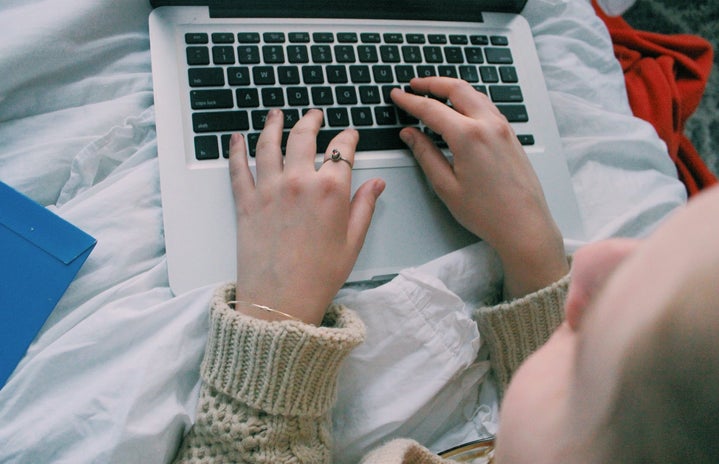This summer, internships became another casualty of the COVID-19 pandemic. Many students who had been hired for internships were informed that they were no longer needed, and those who were looking to join the workforce for the first time were met with much fewer opportunities than anticipated. Fortunately, some companies were able to adapt to these new working conditions and provide opportunities to those qualified. University of Delaware sophomore Rachel Plotzky was one of those fortunate applicants.
A double-major in Finance and Financial Planning with a minor in Entrepreneurship, Rachel is one of University of Delaware’s finest. Not only is she a member of both the Dean’s List and the Honors College, but she is also deeply involved in campus life. She is an active member of Alpha Kappa Psi and works hard as Vice President of Internal Programming for the Special Interest Greek Council.
It’s no wonder Rachel was a strong candidate for internships this summer. In fact, the company that she worked with hired her again this semester based on her worth ethic and professionalism. However, the meaning and nature of internships has changed immensely over the course of this pandemic. This week, I was lucky enough to sit down with Rachel and discuss her experiences with a virtual internship, as well as her thoughts on how the COVID-19 pandemic has, in her words, “changed the game.”
Her Campus: What is your current internship, and how did you come across it with the COVID-19 pandemic?
Rachel Plotzky: I’m a Marketing Intern for XY Planning Network, which is based in Montana. The Lerner School of Business and Economics sent out an email about applying for it, and it was just your name and your resume. They only created it because of COVID and wanted students to have opportunities. And so I applied, and heard back like three weeks later.
HC: You said they only sent out this internship due to COVID, but do you believe that you would’ve had this opportunity or something similar if not for COVID? If so, how would it have been different?
RP: I had applied for a couple of [in-person] internships, and they just cancelled them immediately because of COVID. But I don’t think because of my age that I would’ve had an internship, so I think that having this was amazing. I probably would have worked at like a summer camp or gotten a retail job.
HC: In what ways has the COVID-19 pandemic made your work more difficult for you?
RP: Although the company would have been virtual regardless, it’s a lot harder to form connections and feel like you’re not alone because I have never met these people in person. And when we go on calls, there’s no photo. So it’s a lot of independent work and being on your own, not a lot of collaboration.
HC: Have they or have you tried in any way to make communication more effective? Have you found any new channels of communication?
RP: Not particularly. I mean, I definitely message the people a lot on Slack, which is the messaging system they use, just because you can’t just walk up to someone and say something. So I really try and use that. When I’m on one-on-ones, I also try and turn on my camera to make it a little more personal, but it is mostly nothing.
HC: Do you believe that this internship (besides some communication problems, as you stated) is still providing you with the practical experience needed for your career path?
RP: It definitely is. I’m learning a lot of financial planning skills through stuff I’m reading and stuff I’m listening to that’s for my job, so I’m getting just a lot of on-the-spot knowledge that I will use in my career in the future. Also, I’m learning how to communicate in the workplace in other ways – like emails I should be sending and the backend of stuff. I use Canva, spreadsheets and HubSpot – just all of these techs I wouldn’t be using and would potentially lose the skills I’ve already cultivated with them [if not for this internship].
HC: How are you dealing with an online internship on top of online classes? Does the computer ever get to be too much?
RP: It’s definitely a struggle some days because some of my stuff for work is time sensitive. But I try and just, when I get bored of one, do the other, and at least work an hour to three hours a day [for the internship]. I don’t really go beyond three. It’s definitely a lot to be on the computer all of the time, but I can’t really not be for either.
HC: Since you have to be on the computer for both school and work, what are some of the things that you do to get away from the computer and into a better state of mind?
RP: Going on walks is definitely helpful. I definitely go on my phone less because I just, after being on the computer all day, don’t want to do more. And just making sure I’m not eating and on the computer. I take time for the things that normally I wouldn’t. Normally, I would eat lunch while working or doing classwork, but I try and not be on the computer during those times.
HC: How do you think this experience with COVID-19 will inform your future job, communications with people, and career moving forward?
RP: I think that it has definitely changed the game. I think nothing will be how it was before. Job interviews and jobs themselves are going to be harder to come by, and companies are realizing that they don’t need 100% in office, they don’t need all of these workers and a lot of things can be done virtually. So I think, for our age group, it will definitely be really difficult to get in the job market, but I think a lot of things will be here to stay. Like online learning could become more common. We’re just learning these skills on the spot, but in like five years when we know these skills, it won’t be as big of a deal.
My conversation with Rachel was not only inspiring, as it is amazing to see how students are adapting to and thriving during the pandemic, but also informative to see the ever-changing workplace during COVID-19. Hopefully, more companies will begin affording students opportunities similar to those Rachel has earned and continue learning new, innovative ways to adapt to a world with coronavirus.



